In October a group of reporters and web editors gathered in Orla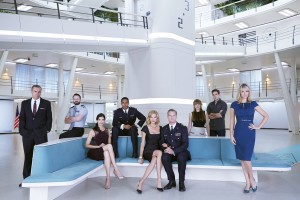 ndo, Florida to find out about the new shows and returning favorites from Syfy. One those shows was the highly anticipated, Ascension. If you don’t already know the premise of the show; Ascension is set in present day onboard generational space ship on a deep space mission to colonize an alien world. This secret mission was launched in 1963 and was to be the future of mankind. Now you know all you really need to know before watching.
ndo, Florida to find out about the new shows and returning favorites from Syfy. One those shows was the highly anticipated, Ascension. If you don’t already know the premise of the show; Ascension is set in present day onboard generational space ship on a deep space mission to colonize an alien world. This secret mission was launched in 1963 and was to be the future of mankind. Now you know all you really need to know before watching.
I was fortunate enough to be one of those reporters on that very sunny Monday afternoon to sit in on the panel. The Q&A session was moderated by Bill McGoldrick, Executive Vice President of Original Content at Syfy and included, Tricia Helfer (Viondra), Andrea Roth (Dr. Bryce), Brian Van Holt (Captain Denninger), Brandon Bell (Gault) and Al Sapienza (Councilman Rose).
BILL McGOLDRICK: This next show is one of our biggest and most ambitious shows we’ve done in a while. Ascension is a new limited series that’s premiering over three nights starting on December 15th, a bold, ambitious thriller that follows an intrepid group of colonists on board the ship Ascension, which was launched by President Kennedy in 1963. We pick them up in the show about 50 years into their journey, sort of the point of no return.
We’ve got a lot of cast members here today in the back, starting with Brandon Bell, who plays First Officer Gault.
(Applause.)
BILL McGOLDRICK: Tricia Helfer, who plays the ship’s chief stewardess and the beautiful wife of captain — of the captain. Her character name is Viondra Denniger.
(Applause.)
BILL McGOLDRICK: Brian Van Holt who plays her husband.
(Applause.)
BILL McGOLDRICK: That would never happen in real life, but on T.V. He plays the ship’s captain, William Denniger. That also wouldn’t happen in real life.
And Andrea Roth, who plays the ship’s doctor, Juliet Bryce.
(Applause.)
BILL McGOLDRICK: And finally, maybe the hardest last name of the day, Al Sapienza, who plays
politician, Councilman Rose.
(Applause.)
BILL McGOLDRICK: So guys, this is our most populated cast of the day. Thank you all for
coming. Why don’t we just go down the row, starting with you, and talk a little bit about your
character, how you came to this one, and we can go from there.
BRANDON P. BELL: Cool. How I came to audition for the role? I was fortunate enough to get in.
But what drew me to it was just the concept in general. This is like historical fiction, in a sense. It’s really cool that there was once a project called Orion that had a lot of parallels to Ascension.
But Oren Gault, in general, I think there’s a quote by Raymond Chandler that Phil Levens, we talked a lot about it. It’s “Down thes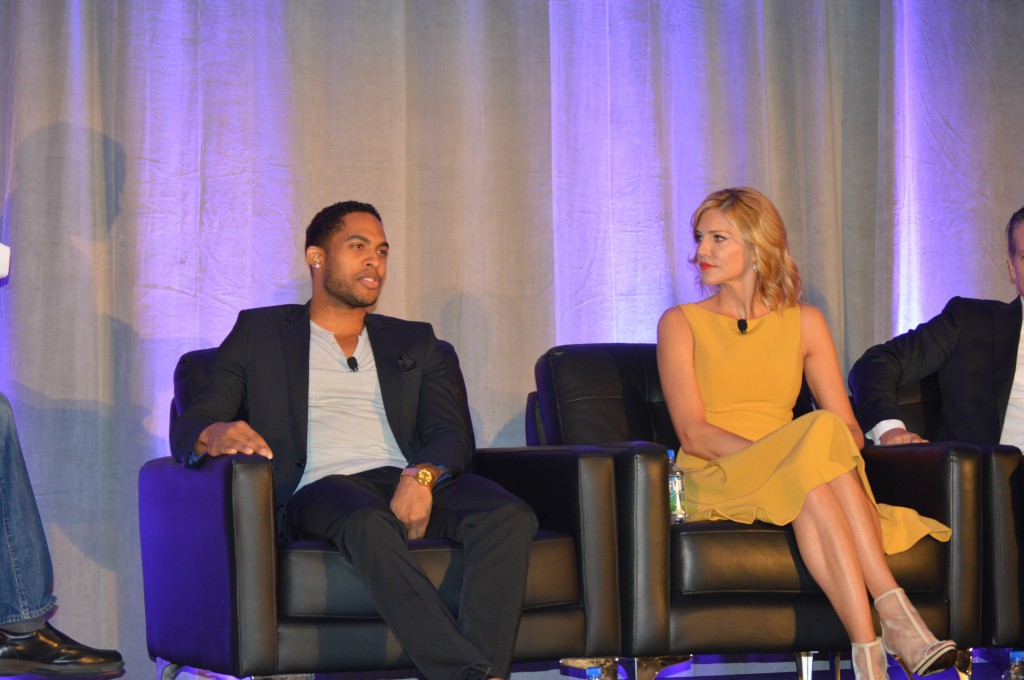 e mean streets a man must go who is … neither tarnished nor afraid.” And Oren Gault personifies that to the max. He’s a reluctant XO of the ship. He doesn’t necessarily want to investigate the murder, but it keeps him focused. It keeps him motivated. And so, he’s a great character, having been born in the lower decks and having made that rare transition to the upper decks. He’s a great, interesting character to play with a lot of internal issues.
e mean streets a man must go who is … neither tarnished nor afraid.” And Oren Gault personifies that to the max. He’s a reluctant XO of the ship. He doesn’t necessarily want to investigate the murder, but it keeps him focused. It keeps him motivated. And so, he’s a great character, having been born in the lower decks and having made that rare transition to the upper decks. He’s a great, interesting character to play with a lot of internal issues.
BILL McGOLDRICK: Great. Tricia, welcome back to Syfy, by the way.
TRICIA HELFER: Thank you.
(Applause.)
TRICIA HELFER: I am definitely very happy to be back. Viondra is a complicated character. What you see on the surface you think is one thing, and then a very strong character, and also dealing with some of the sexual — we haven’t gone as far as we have now, so contemporary in our world. So I think she’s also a woman that sort of feels like she hasn’t been able to accomplish what she would necessarily like to accomplish on her own. She stands behind her man, but she’s also as, Philip has told me, sort of the steel in his spine. So she definitely works, works hard to stay in power. She grew up on the lower decks as well, as Brandon’s character, and has made her way to the upper decks and is determined to stay there and to keep her husband in power.
BILL McGOLDRICK: All right. Brian?
BRIAN VAN HOLT: Yes. I’m Brian Van Holt. I play Captain Denniger, which would never happen in real life. But if it did, Bill, you would be my first passenger. We would be going down.
BILL McGOLDRICK: Gladly.
BRIAN VAN HOLT: That should be a spin-off, all right, going to be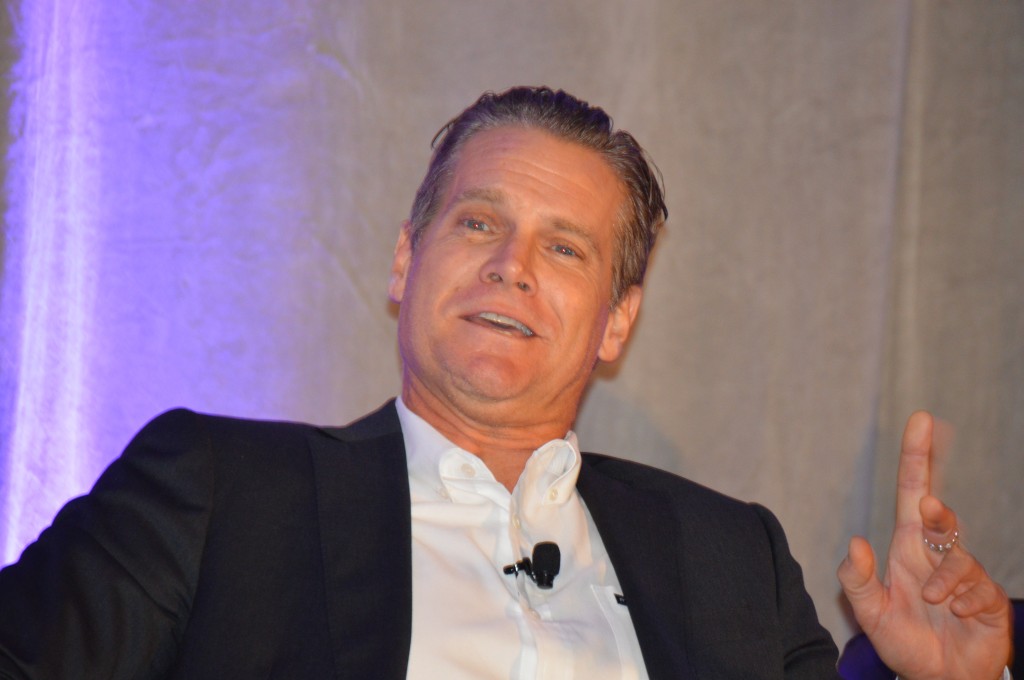 called Descension. How did I — I got a straight offer. Just kidding. This character, I begged. I met with the creator of the show, Philip Levens. I’m really –I’m upset that he’s not here because he’s –everybody should get a chance to talk with him. He’s got an amazing brain. This is his. This is his brain child. And one of the main reasons why I wanted to do this is because of him and his intelligence and his ideas and his imagination. I’ve never been a part of any kind of show like this, nor have I ever played a character like this, and I was very anxious to do so. I wanted a departure from what I had been doing for the pastfew years.
called Descension. How did I — I got a straight offer. Just kidding. This character, I begged. I met with the creator of the show, Philip Levens. I’m really –I’m upset that he’s not here because he’s –everybody should get a chance to talk with him. He’s got an amazing brain. This is his. This is his brain child. And one of the main reasons why I wanted to do this is because of him and his intelligence and his ideas and his imagination. I’ve never been a part of any kind of show like this, nor have I ever played a character like this, and I was very anxious to do so. I wanted a departure from what I had been doing for the pastfew years.
So Captain Denniger is the captain of this wonderful ship called Ascension, and this is my beautiful wife, who is the real captain, which would be — that would be realistic in this, for sure. You know, he’s a natural born leader, and the captain of a ship has a lot of responsibility. He’s in charge of — how many passengers do we have now, 600? The whole community, he’s in charge and responsible for their well-being and to get to our destination, which is called Proxima.
But Captain Denniger is not without his moral ambiguities. He deals with some demons and how he– how he deals with them, his outlets, are morally questionable, which made him a very interesting character to play for me. That would happen in real life. So he’s not your normal like — he’s definitely not Captain Kirk. I don’t even know what that means, really, but he’s — he’s a very layered character. What else can I say about the captain?
BILL McGOLDRICK: That’s good. He really can. I was on a plane with him yesterday.
BRIAN VAN HOLT: Sorry. Go ahead.
ANDREA ROTH: I am Andrea Roth. I play Dr. Juliet Bryce, the head doctor onboard Ascension.
More importantly, I am a mother struggling with a teenage daughter, and the issues that happen, added to that, is since we’re on this ship and we were born on this ship, and my daughter has no sort of choice in her life or what career path to take, and obviously all of that is very limited. So she and I are sort of struggling, mother/daughter stuff there. And also, she finds herself attracted to a lower decker onboard our ship. I’m going to go as long as he did. Sorry.
BRIAN VAN HOLT: You were on her side.
ANDREA ROTH: My daughter is — and onboard the ship, you have to be matched. We don’t get to choose who we’re with, so I know, possibly from a past experience, that her falling for someone and following that passion could only lead to heartbreak, so I’m trying to protect her.
BRIAN VAN HOLT: Yeah, but tell us about the show.
BILL McGOLDRICK: And Al, just a tiny bit about your character.
AL SAPIENZA: Al Sapienza. I play the mafia guy on the show — no, just kidding. Getting this part, I am very, very excited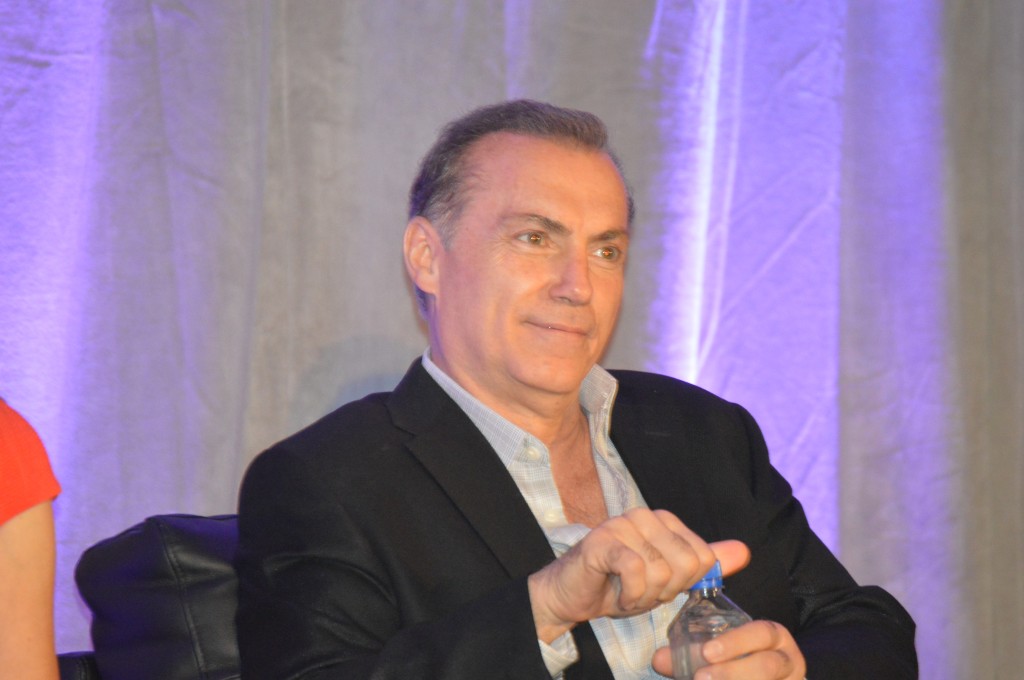 about the concept of this show, and that’s what drew me to it. It’s a parallel society that has had no– it’s not influenced in any way by anything on Earth for 50 years. We don’t know that John Kennedy got shot. We don’t know about the civil rights movement. We don’t know about women’s lib. Our input from earth stopped in 1963. So we’re the society on the ship, and I am the political end.
about the concept of this show, and that’s what drew me to it. It’s a parallel society that has had no– it’s not influenced in any way by anything on Earth for 50 years. We don’t know that John Kennedy got shot. We don’t know about the civil rights movement. We don’t know about women’s lib. Our input from earth stopped in 1963. So we’re the society on the ship, and I am the political end.
And interestingly enough, even though we’ve had no influence from Earth, the political end evolved the same way as politicians on earth. I am self-serving, I put myself first instead of the good of the ship, and I’m having a love affair with the captain’s wife. So I’m the perfect politician. It’s an exact evolution to what happened on Earth.
So anyway, that’s my character.
BILL McGOLDRICK: Thank you.
AL SAPIENZA: You’re welcome.
BILL McGOLDRICK: All right. Let me open it up to questions.
QUESTION: I get to be first. Is that on? Okay. Sorry. Michael Hinman from Airlock Alpha.
When you guys talk about this being a limited series, I mean, are we talking backdoor pilot? Are we talking, you know, that this is really is limited and we’re kind of stopping here? It’s more of a dull question.
BILL McGOLDRICK: I’ll do this one. It is a six-hour kickoff. You know, we have a tradition at this network. Battlestar Galactica started that way, as Tricia knows. You know, other networks do it. Its concepts this big that require this much world building. Sometimes you can’t do it in just a two-hour pilot. You need more answers, and especially this one. When you guys watch it, you’ll understand why. So we’re going to air it. We’re going to make a big event out of it, and then we’re going to talk about a future, hopefully, very shortly after that.
QUESTION: Kenn Gold from Media Boulevard. I’ve got a question for, I guess, whoever wants to answer it. But if you’re given an opportunity like this, would you actually go?
BRIAN VAN HOLT: I think I would.
AL SAPIENZA: If the women were this good looking, definitely.
BRIAN VAN HOLT: If we were paid what we’re paid on Ascension, one hundred percent absolutely.
TRICIA HELFER: I might have trouble with it.
ANDREA ROTH: Well, your cats.
TRICIA HELFER: If I could take my cats, yes.
BRANDON P. BELL: I’ve always wanted to go to space. I mean, who doesn’t? I think the mission, the purpose of the mission, is super righteous and we’re the leaders of a new frontier, to propagate a new planet and carry on humanity, so that’s cool. I think I would. Once I’m on it, it might present a whole different number of issues, I don’t know if I would regret it, but initially, upfront, yeah, I think it would be really enticing. It would be hard to turn down, you know.
AL SAPIENZA: I’m with him.
QUESTION: Seeing as how you and the other characters are going to have to evolve without outside influences from earth, what kind of research was needed for your roles?
BRIAN VAN HOLT: God, I hate that question.
BILL McGOLDRICK: A lot of long talks with Phil Levens.
BRIAN VAN HOLT: By the way, it’s true; a lot of conversations with Philip Levens. What kind of research? I studied the time period.
TRICIA HELFER: Yeah, studied the ’60s.
BRIAN VAN HOLT: The literature at the time, the movies at the time, and tried to go back and get a sense of the vibe, the feeling of that era.
TRICIA HELFER: Which, conveniently, right after I was cast, CNN ’60s series, the documentary series, started, so that was —
BRIAN VAN HOLT: Perfect timing.
TRICIA HELFER: — perfect timing, to work out on the treadmill and study at the same time.
AL SAPIENZA: And it’s interesting, for an actor, it’s the opposite of what you normally do. For a role, you have to research what you don’t know. For this one, you just had to forget what you knew, like you have to imagine what it would be like if there were no civil rights, if there was no Martin Luther King, there was no Malcolm X, if there was no women’s lib movement, and total equality now in most places in the United States, like what would society be like without that? And it’s basically Mad Men, you know. So it’s Mad Men meets Star Trek meets Lost.
QUESTION: That actually kind of leads into my question, because I wanted to ask about the gender roles on the show. I guess this is for the ladies. As you play these characters on the show, does your character struggle with the fact that there is no women’s lib movement?
TRICIA HELFER: You know, I think one of the things I found interesting about the show is how, obviously, it was the early ’60s, but our society has also evolved in some way, so it’s not exactly like Mad Men. It’s not exactly like going back to 1963 or 1962. It’s its own sort of society that has evolved in its own way, but a society of 600 people, so we evolve much slower; a small town as opposed to a big city.
And so, I did find it interesting. I play a very strong character, and my character is strong, but yet she had to be the one behind and maybe speak up in the chambers, you know, our quarters, as opposed to being able to speak up necessarily in public, in a group. I think my character struggles with wanting to have done more. And I think in one way, admires the doctor, and I think I say to you at one point, your character, you’re lucky you found something meaningful to do on the ship. So my character struggles, even though she’s in a position of power on the ship, she struggles with it not being necessarily what she wants to do mentally and emotionally.
ANDREA ROTH: And I am the head doctor, so even though 50 years has gone on, a female is – you know, I am the head doctor. So we have no knowledge of the women’s lib, and I think we just have naturally stronger women tempered by a societal genteelness, I guess, is sort of what attracted me.
BRIAN VAN HOLT: Yes.
QUESTION: I actually am a little — I don’t want to say confused by that, but I just want to ask, do you guys think that even without radical movements to push for equality, that even in a society like yours, it’s just a natural instinct to eventually evolve into equality?
AL SAPIENZA: That’s a good question.
QUESTION: And then my other question was, does the entire show take place on the ship?
BRIAN VAN HOLT: The entire show takes place on the ship.
ANDREA ROTH: If I could jump into that first one about, in terms — oh, I just lost what I was
going to say.
(Laughter.)
AL SAPIENZA: Would we naturally evolve with equality rights, and you know, that was the
question. I think my answer is absolutely. It’s the right thing. So hopefully, in the human condition anywhere, eventually, just my opinion, yes, of course it would, because — but there are always those forces. They’re self-serving and have their own reasons to keep things unfair, and their own profits and their own power. And that goes on in the ship a little bit, too.
TRICIA HELFER: Well, you’re right. It does sort of naturally — it is naturally evolving, because the younger generation, your daughter, for instance, is kind of fighting —
ANDREA ROTH: Feisty.
TRICIA HELFER: — and wanting to get further than she necessarily is expected to, and things like that. So yeah, without a big movement, I think it is evolving.
BILL McGOLDRICK: And I think it’s important to remember, this is the first generation that’s been born on the ship. Some of these characters were very young kids when they were first brought on board, so those movements —
ANDREA ROTH: No, none of us.
AL SAPIENZA: I’m the only one. I’m the only one that was alive when we walked on the ship. And another interesting point about this show, and me personally as an actor — I did the Sopranos and House of Cards. I’ve done some interesting projects. I think the concept here is amazing and the writing is amazing.
President Kennedy picked the smartest people on Earth and the most qualified people to take this journey. It’s based loosely on the Orion project. Well, as you know from yourselves and your friends, you could get a perfect score on your SATs — well, and have your kids not be so bright. Right? So this is the second generation. So you don’t have the smart — well, what was that phrase that Kennedy used? The best and the brightest. You don’t have them. This is the second generation running the ship, and there’s — and in a matter of months, we’re going to reach the point of no return. We can’t go back to earth. So people are panicking a little. There’s a murder that takes place that — we never had a homicide before. Everyone is freaked out about it, and we don’t know why.
And in answering your question, there is another parallel study. This ship is sponsored in the U.S. There is the government, the government story about whether, you know, on ground — I don’t want to go into it too much, but it’s a fantastic thing that you will see as you watch the show. But yes, there’s the government — you know, the ground government following this as close as they can. But anyway, yes.
ANDREA ROTH: I also wanted to say that we were populated, like my parents were incredibly smart doctors and in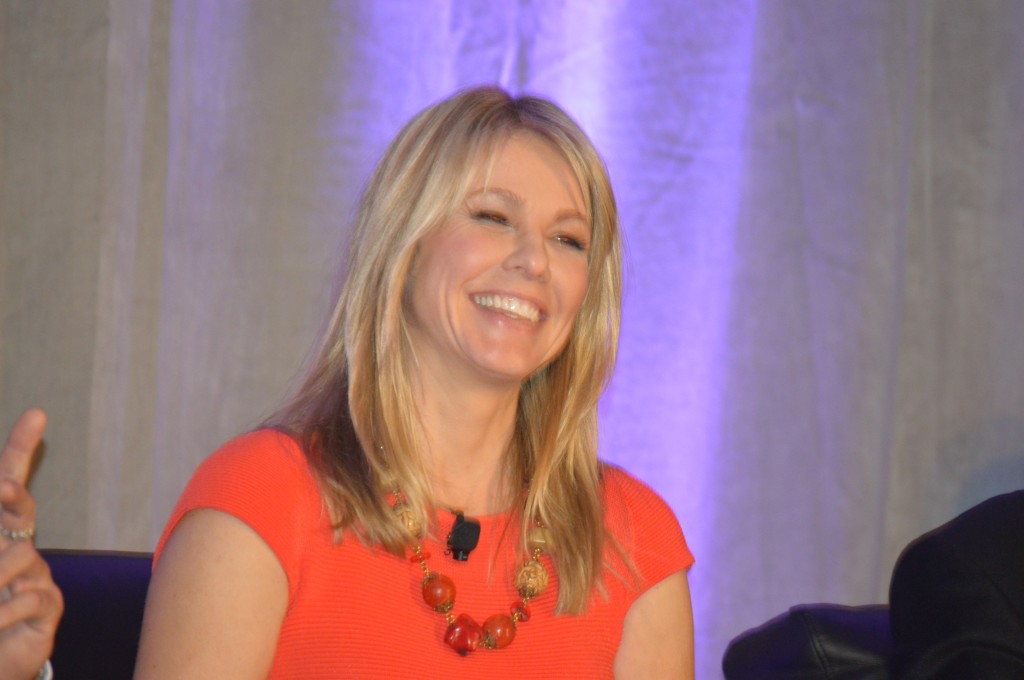 tellectuals, and the people who actually chose to go on the ship at that time were quite progressive, and you know, especially in their thinking. Therefore, I think their children would have been raised with — you know what I mean? They were allowed to sort of give their own values on the ship, so I think my mother would have instilled that in me.
tellectuals, and the people who actually chose to go on the ship at that time were quite progressive, and you know, especially in their thinking. Therefore, I think their children would have been raised with — you know what I mean? They were allowed to sort of give their own values on the ship, so I think my mother would have instilled that in me.
BILL McGOLDRICK: Great. Next question?
QUESTION: James Hamilton, Geekstronomy. I am curious. Is there ever going to be a backstory on how the parents were actually picked for this mission, speaking of picking the best and the brightest?
BILL McGOLDRICK: You’ll get a lot of those answers, for sure.
QUESTION: We will get those answers. And one other question; is there a limit to how many children are..
ANDREA ROTH: Yes. We have to stay the same number.
BILL McGOLDRICK: You will definitely get that answer as well.
TRICIA HELFER: Just like there’s genetic pairing and matching, arranged marriages, so to speak, there’s also a birth list ceremony. You know, the captain and Viondra gave up their right to have children, but there’s a birth list ceremony every year, so it depends how many people have passed away as to how many children can be born. So many — many people, many couples on the ship will never be able to have the right to have a child.
AL SAPIENZA: And there’s a constant population that has to be maintained. People have to die in order for people to be born.
BRIAN VAN HOLT: It’s a self-sustaining ship, so we can only allow a certain amount of people on the ship, so we have to monitor the number of the population.
AL SAPIENZA: It brings up a bunch of interesting questions, that if this — that if this were to really take place, like controlling a society and having it evolve itself. Philip’s an intelligent guy, the man who wrote this. It’s a very interesting concept.
QUESTION: Thank you.
QUESTION: This is kind of a thick question, but also a serious question. How is there a black guy on the ship, if you all boarded in the 1960s, sort of?
AL SAPIENZA: You’re right. And he’s the XO, second in command.
QUESTION: Yeah, but wouldn’t there presumably be like all white people on the ship?
BRANDON P. BELL: It’s a small microcosm of what the U.S. represents racially, so there’s sprinkles here and there, but that’s the intention of it. We are to carry on the fabric of humanity, specifically regarding the United States and what that looks like on Proxima. So everything is very specific, from birth lists, resources, even genetic makeup, and the look of the ship in terms of the people and the ethnicity is very specific to that.
AL SAPIENZA: And there was a self-created caste system on the ship that didn’t come in the beginning.
BRANDON P. BELL: Right.
AL SAPIENZA: There are things called the lower decks and the upper decks. The executives, the officers, the politicians, they’re in the upper decks. The maintenance people are in the lower decks, and depending on where you fall on your aptitude test, is where you are going to work. He came from the lower decks, and he worked himself up to run the ship. And one other point, and this is just my opinion, again.
In 1963, the smarter people already believed in equal rights; the northeasterners, the more educated people already thought it was wrong. And I’m not being, you know, political here, but I’m saying — you know what I mean? But the smart people in ’63, you brought up this point, they were on the ship. So anyway, you know what I mean?
(Applause.)
BILL McGOLDRICK: One more question, guys.
QUESTION: I’d like to hear from all of you on this, but Al, you mentioned Mad Men versus Star Trek or meets Star Trek meets Lost. Those are basically all big staples on Twitter, on social media. Do you think Ascension is going to lend itself well to sort of a social media conversation, debates back and forth, and are each of you excited and willing to get engaged in those debates online?
AL SAPIENZA: Me? I’ll answer first quickly. Absolutely. Can I tell a really quick story, like a real
quick story?
BILL McGOLDRICK: Sure, Al.
AL SAPIENZA: Let me tell what I saw in the pool here this morning, right, and I make no judgment on it, none whatsoever. But I saw a woman in this pool in a burqa, completely dressed from head to toe, swimming with her baby, and ten feet away was like a 50-year-old woman in a bikini with her children. And I was thinking like, the diversity of mankind. No other animal in the animal kingdom has that diversity. You can get a lion that’s a little bit cranky and they bite you one day. But basically, we’re the only animal that’s we’re from here to here. You know, we’re poets and we built the Verrazano Bridge, and then we’re selfish warlords. So, we have an opportunity, and I think this show, the concept of this show is brilliant, and I’m just as excited about it as you guys are, and I can’t wait to actually see it.
The potential here to have these debates are tremendous, and the potential of where this show could go is tremendous, and we’re all going to find out, you know, in December, exactly how it lands on people. And I’m hoping that — I have high hopes for this. I really hope it lands where I think it’s going to land.
But yes, my answer is yes.
TRICIA HELFER: Social media is the new watercooler talk, right, and there are so many angles and elements to the show that lead into that, I think. I think it’s something that people will want to discuss, will want to see how somebody else feels about it, that type of thing.
So, I’m all good and looking forward to engaging. I have to bump up on my technological skills, though.
BILL McGOLDRICK: We’ll teach you. We’ve got people for that.
BRIAN VAN HOLT: I feel the show will definitely provoke conversation and debate, and I’m looking forward to it. I have to — I don’t tweet or — I got to join this tweeter thing everybody is talking about.
(Laughter.)
BRIAN VAN HOLT: I think the captain of the ship, which never really happened, needs to tweet about it. But yeah, I think it will provoke a lot of conversation. It’s a forward-thinking show and it’s exciting.
BRANDON P. BELL: I certainly hope so. I think it’s extremely socially relevant. The historical fiction aspect is really cool, and I think it definitely has the ability to be one of those shows where people want to talk about the themes that are so relevant within them. There are so many parallels with what’s going on currently, and what’s happened, with what’s going on, on the ship. If you have the best and the brightest in the room, what could happen? If you had time and resources for them to continue living in that room, what would happen? And I think that’s essentially what we all aspire to see at some point. It’s the ideal situation. It tries to be utopia in a sense, but perfection is always impossible, and so things are– there’s tons of surprises and there’s wonderful stories and characters, and I definitely feel strongly in hoping that people connect. I really think that’s possible, and it will definitely create some thoughtful conversation for sure.
AL SAPIENZA: Plus we’ve got a great looking cast.
BILL McGOLDRICK: Well, thank you guys so much. This was a great panel. This is one of those shows; we could have done a whole day on it, so thank you.
(Applause.)
Ascension premieres on Syfy tonight at 9pm and airs for 3 nights.

